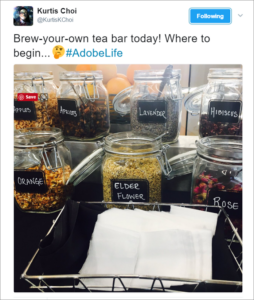
When it comes to building out your brand’s social media marketing strategy, one of your primary objectives is crafting a multi-channel amplification plan for sharing content that raises awareness, fosters engagement, and ultimately helps drive new leads. For many, this means mapping tactics and time to specific brand-owned social channels.
But there may be one tactic and channel that’s missing from your mix: your employees and their respective social networks. Or to attach a marketing buzzword to this—employee advocacy.
Your employees are one of your most powerful social media marketing tools. They’re the people behind your brand, working hard to support your company’s mission and help achieve your business goals. They’re the people who have first-hand insights into your company’s culture, and the quality of your products or services. They’re the people who can lend some real credibility and authenticity to your marketing efforts.
Your employees are one of your most powerful #socialmediamarketing tools. #employeeadvocacy Share on XThe best part? Technically speaking, including employees in your marketing efforts doesn’t cost you a thing, but can yield big rewards. In fact, brand messages are re-shared 24 times more frequently when distributed by employees versus the brand, according to an MLS Group infographic. In addition, employee advocacy on social media can help generate more leads, close sales more quickly, and help retain customers.
Now that we have that out of the way, you’re probably wondering how you get your employees on board or how to start an employee advocacy program. At TopRank Marketing, employee advocacy is a part of our own social strategy. Below I share some helpful tips to get your efforts rolling.
#1 – Get buy-in from top leadership.
Getting your company’s top executives and department leaders to support your employee advocacy efforts is a critical first step. Not only will their social activity help spread your message throughout their social network, but also lend credibility that will trickle down throughout the rest of the company ranks.
Get them on board by illustrating the business value their efforts can bring to the company. LinkedIn’s SlideShare is bursting with presentations featuring employee advocacy insights, case studies and statistics that you can use to craft a short, sweet and data-filled pitch. Here are a couple I’d recommend checking out for ideas:
- 16 Employee Advocacy Statistics to Guide Your 2016 Marketing Strategy (Kredible)
- Measuring and Optimizing Employee Advocacy (LinkedIn Marketing Solutions)
- How to Sell Your Company on Employee Advocacy (SocialChorus)
#2 – Activate employee brand ambassadors.
It’s no secret that social media has become part of the fabric of our daily lives. And let’s face it, your employees are probably engaging on their respective platforms while at work every day—and they may already be sharing content about your brand. So why not leverage that?
Consider creating an employee brand ambassador committee where participants can work with your marketing team to develop or refine your employee advocacy program, as well as coach others into becoming social champions. Do a little research to find out which employees are actively sharing your brand’s content, compile your list and then reach out. When you make contact, thank them for their efforts, ask them to become a more integral part of your company’s social media strategy, and demonstrate the benefits.
At the end of the day, brand ambassadors will likely have more drive and pride in spreading the word about your brand, and they’ll also be an on-the-ground advocate encouraging others to join in.
#3 – Make participation easy and fun.
If you want your employees to take action on social media, you have to make it easy and comfortable for them. Here are a few tips to consider:
Draft pre-written social messages.
By pre-writing social media messages for your employees to share, all they need to do is copy, paste and click the post button. Easy peasy.
Also, make sure to include a mix of company-related content and curated industry content. This will help them stay up to date on the latest news items, create a helpful mix of content to their audience, and help expand their network of followers.
Set clear guidelines on how they should be sharing your content.
Most employees’ social accounts will include both personal and professional postings—and you’ll want to make sure their audience knows that your content is part of the latter for transparency. Consider creating a company-specific hashtag to include in all messaging. For example, Dell employees use #IWork4Dell and Adobe folks use #adobelife in all their posts.

Offer social training.
Some of your employees may want to get involved, but are uncomfortable with their skill level—especially when it comes to promoting your brand or their own presence at an event. Offer group or one-on-one training to get them up to speed on best practices.
Make helpful tools available.
As a marketer, you likely use social media tools to help you monitor and manage your brand’s social presence. Many of those same tools can help your employees manage their advocacy efforts, too. Compile a list of free tools and make it easily accessible to all employees so they can manage their sharing on their own.
If you have a larger budget, consider investing in an enterprise employee advocacy tool such as Oktopost, Sociabble or Hootsuite Amplify to make it easy for employees to share or suggest content. In addition, consider using a tool that offers a gamification element such as leader boards, badge earning or other incentives. This can add a little fun to the mix, as well as inspire a little friendly competition. Of course, gamification isn’t a sure-fire way to get participation or sustain it, but when combined with other strategic efforts, it can definitely help.
If you want your employees to take action on #socialmedia, you have to make it easy. #employeeadvocacy Share on X#4 – Show them they’re making a positive impact.
Once you’ve gotten your employees to start sharing, the next step is to ensure they keep it up. And one way to do that is to highlight the positive impact they’re having by sharing encouraging metrics and sales insights.
For example, TopRank Marketing Director of Agency Marketing Ashley Zeckman regularly updates the team on how our activity is contributing to brand visibility through impressions and social shares. She also recognizes the top sharers—which typically sparks some friendly competition around the office.
#5 – Don’t force it.
The beauty of employee advocacy on social media is its authenticity. As I mentioned in my opening, your employees have unique insight into what your company is all about. So, whatever you do, do not mandate employee social sharing. A mandate will stifle that authenticity and leave a bad taste.
Is employee advocacy part of your social media marketing strategy? How are you getting them on board? Tell us in the comments section below.
Disclaimer: LinkedIn Marketing Solutions and Dell are TopRank Marketing clients.


